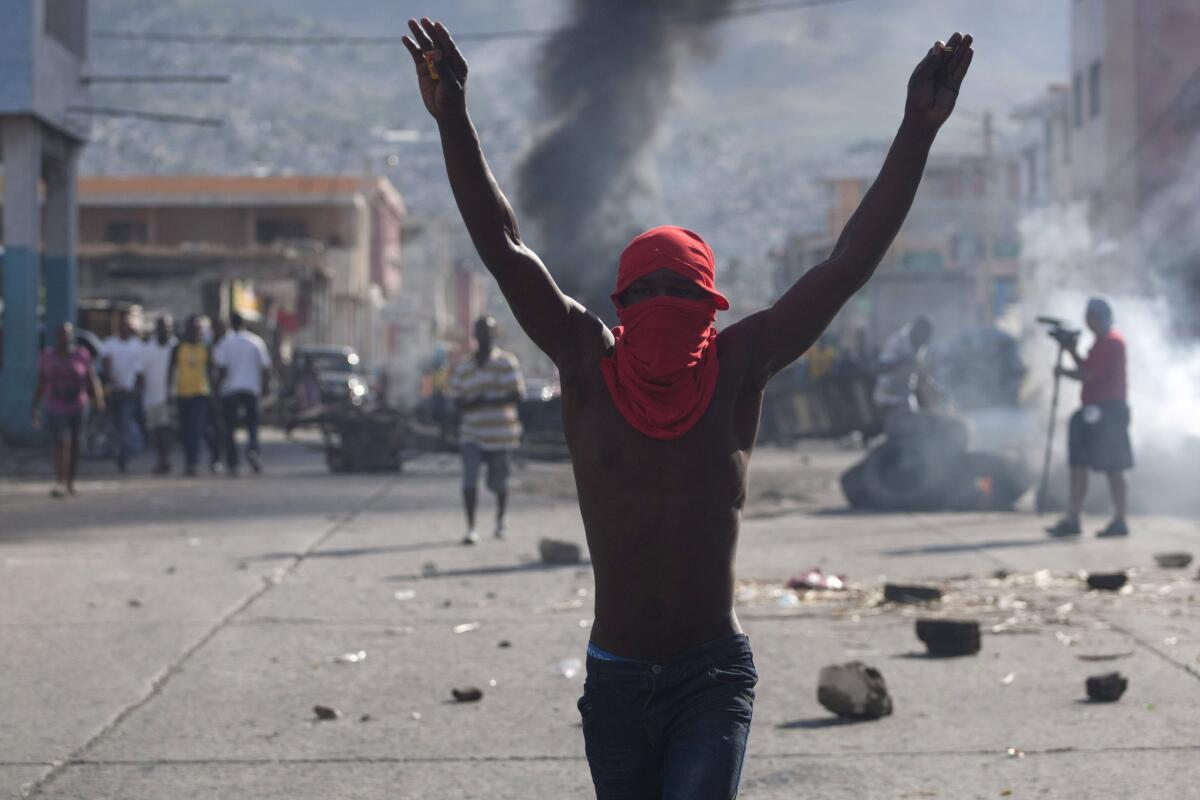Crucial deadline looms in standoff over Haitian elections

- Share via
Reporting from Mexico City — A stubborn stalemate threatening the stability of Haiti approached a decisive deadline Monday as protesters demanded the president’s removal and authorities continued to resist holding legally required and long-overdue elections.
In a country where politics are often dysfunctional, Haiti’s current crisis -- extending into the fifth anniversary of a catastrophic earthquake that by some estimates killed a quarter of a million people -- is seen as especially ruinous.
On Monday, the terms of most legislators expire, and President Michel Martelly is expected to dissolve the body and begin to rule by decree. Haitians know dictatorship well, and the prospect of a return to one-man rule worries citizens, opposition politicians and the international community whose aid has largely kept the island nation afloat.
Martelly and a delegation of legislators were locked in negotiations Sunday in an effort to avoid the breakdown before Monday’s deadline, news reports from Haiti said.
In recent weeks, the prime minister was forced to step down as a concession to near-daily demonstrations and hard-line opposition politicians. But the move did not resolve the standoff.
Evans Paul, the former mayor of Port-au-Prince, the capital, and Martelly’s nominee as the next prime minister, described the country as being engulfed in “a chaotic atmosphere.”
“It’s not something you can solve with a speech, or solve with laws or an executive order,” Paul told the news agency Reuters in an interview. “This will take time, a culture, education and certain behavior. But this needs to start now.”
Martelly was supposed to call elections in 2011 but was blocked by opposition politicians, who contend election rules favor government candidates. Each side blames the other for the standoff, which also threatens the already spotty reconstruction after the quake.
The magnitude-7.0 earthquake on Jan. 12, 2010, destroyed or heavily damaged 300,000 buildings in densely populated Port-au-Prince, leaving an estimated 1.5 million people homeless. The government put the death toll at more than 300,000, while other agencies put it slightly lower; an exact number was never known because of the extent of the devastation and the need to bury many bodies en masse and without identification or accounting.
Tens of thousands of Haitians continue to live in tents or other temporary shelter after their homes were destroyed.
U.S. officials have been working behind the scenes to push Martelly and the opposition toward elections. In a statement Sunday, the U.S. government noted “with grave concern” that the impasse had not been broken with the approval of an electoral law that would allow voting this year and urged swift action.
“However, if such a solution cannot be reached by Jan. 12, the U.S. will continue to work with President Martelly and whatever legitimate Haitian government institutions remain to safeguard the significant gains we have achieved together since the Jan. 12, 2010, earthquake,” the statement said.
“The Haitian people have the right to elect their leaders,” the statement added, “and in these circumstances the U.S. would expect the president to use his executive powers responsibly to organize inclusive, credible and transparent elections, in an expeditious manner.”
For more news out of Latin America, follow @TracyKWilkinson on Twitter
More to Read
Sign up for Essential California
The most important California stories and recommendations in your inbox every morning.
You may occasionally receive promotional content from the Los Angeles Times.











